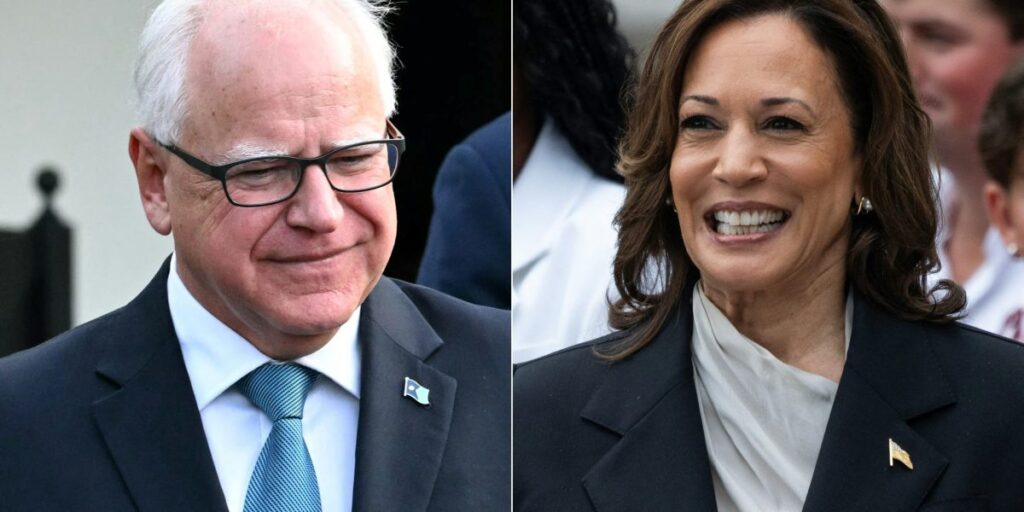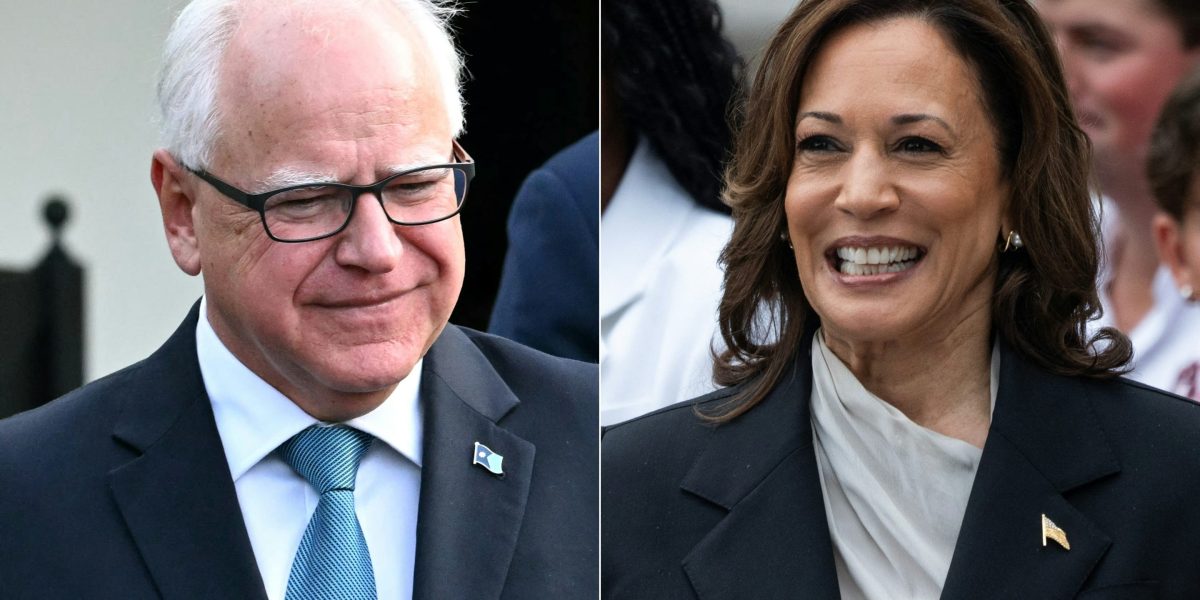5 ways a Harris-Walz win could reshape U.S. health care
Big changes could be coming, according to policy experts.


Kamala Harris has chosen a running mate. The vice president and Democratic presidential nominee announced Tuesday that she’s selected Minnesota governor Tim Walz for her 2024 ticket.
“As a governor, a coach, a teacher, and a veteran, he’s delivered for working families like his,” Harris wrote on X, formerly Twitter. “It’s great to have him on the team.”
Now that the Democratic ticket is locked up, plenty are wondering about what a Harris-Walz win could mean for the country going forward. A May 2024 poll by the Pew Research Center found that health care is a major concern for voters going into this election, with questions about what Harris and Walz would potentially change across a range of health care issues in the country. Harris’ campaign is still in the early stages, and she hasn’t spoken out about her all her views on the topic just yet. But her history with several areas of health care suggests her stance on a range of topics.
Health policy experts stress that a lot of what Harris and Walz could do in office largely depends on what happens in Congress. “This is still a divided country,” says Leighton Ku, PhD, MPH., director of the Center for Health Policy Research at George Washington University’s Milken Institute School of Public Health. “I don’t think Harris would be likely to have control of both houses of Congress, but all sorts of things can happen.”
“No matter who the president is, reforming health care in the United States is a tall order given the power and lobbying abilities of the health insurance companies,” says Perry N. Halkitis, Ph.D., dean of the Rutgers School of Public Health.
Here’s what health policy researchers and a doctor anticipate may change if Harris and Walz take the election in November.
Reproductive rights will become a focus
Harris has repeatedly been vocal about her support for reproductive-care access. In December, she launched a Reproductive Freedoms Tour for which she hosted events to highlight the fallout of abortion bans and shared the stories of people who were impacted by strict legislation around reproductive rights in their states.
“Extremists across our country continue to wage a full-on attack against hard-won, hard-fought freedoms as they push their radical policies—from banning abortion in all 50 states and criminalizing doctors, to forcing women to travel out of state in order to get the care they need,” she said in a statement at the time. “I will continue to fight for our fundamental freedoms while bringing together those throughout America who agree that every woman should have the right to make decisions about her own body—not the government.”
In March, Harris also made what is believed to be the first official visit to an abortion clinic by a sitting president or vice president. During that visit, she called abortion access a “very serious health crisis facing women,” per NPR.
“Harris is a longtime supporter of abortion rights, while Trump touts his appointments to the Supreme Court that resulted in Roe v. Wade getting overturned,” Larry Levitt, executive vice president for Health Policy at KFF, tells Fortune.
Walz also has a history of supporting access to abortion care. In 2023, he signed several bills into law to protect people who sought or provided abortions in Minnesota. “Today, we’re protecting the rights of Minnesotans and making sure our state remains a place where people have the freedom to get the care they need to live their fullest lives,” he said in a statement at the time. “We’re putting up a firewall to ensure Minnesotans have the freedom to make their own healthcare decisions.”
But Levitt says that a Harris-Walz administration is likely to be limited in what it can achieve. “How much either Harris or Trump could do to affect abortion access would depend a lot on who controls Congress, but there are executive actions they could take to shift policy to some extent,” he says.
Ku agrees. “She may have some room to do more in terms of executive actions or really trying to pursue legal actions to sue states that try to further restrict abortion access,” he tells Fortune. Harris could continue to push a requirement on hospitals to provide abortions in emergencies where a woman’s health is at stake, even in states where abortion is banned, Levitt says.
Ultimately, Ku says that Harris is likely to have the biggest impact on reproductive rights if she’s able to put a new judge or two in the Supreme Court. “If she is elected president, I would expect that she would have the opportunity to name one or two Supreme Court justices over her term,” he says. “That leads to the possibility of potentially changing the Court.”
Health care may become more accessible and affordable
Still, policies on this are vague at the moment. “Harris supported Medicare for All in the past, offering a proposal in 2019 that would have extended Medicare to everyone gradually with an option to enroll in a private insurance plan,” Levitt says. “Harris’ previous support for Medicare for all is indicative of her desire to achieve universal coverage, but I don’t expect her to push it on the campaign trail or if she wins the presidency.”
Walz has also stressed the importance of healthcare access. “What Minnesotans want from their health care is simple,” Walz said during his 2019 inaugural speech. “They don’t want to get sick in the first place. But if they do, they want care at a price they can afford and at a location close to home.”
Levitt says he’d expect the administration to focus more on making the Affordable Care Act—also called Obamacare—coverage more affordable.
Ku agrees that it’s unlikely that Harris would put Medicare for All on the front burner right now. “She continues to be in favor of Medicaid expansions and to keep the Affordable Care Act marketplace strong,” he says.
There may be more price caps on select medications
Levitt points out that Harris has campaigned on the Biden-Harris administration’s political victory over the pharmaceutical industry that gave the government authority to negotiate drug prices in Medicare for the first time, including capping insulin copays at $35 per month. “She has indicated she wants to take these drug cost relief measures further,” Levitt says.
“I assume that she will continue to pursue this,” Ku says. However, he points out that “some of this is tied up in courts.”
Walz also has a history of working to help constituents afford their medication. In 2020, he signed a bill into law that would help Minnesotans afford their insulin. “Minnesotans should not die because they are forced to choose between putting food on the table and affording the drug they need to survive,” he said in a statement at the time. “Despite resistance from the pharmaceutical industry, the grit and determination of Minnesotans with diabetes, Minnesotans who have lost loved ones with diabetes, and their legislators moved this bill forward. It is downright inspiring. This hard-fought law will provide much-needed relief to Minnesotans struggling to afford their insulin. We must continue to put Minnesotans first and ensure people don’t struggle to afford the care they need.”
Mariana Socal, PhD, an associate professor in the Department of Health Policy and Management at the Johns Hopkins Bloomberg School of Public Health, expects that this will be a “key issue” for the Harris-Walz campaign. “Having prescription drug affordability front and center and building on the accomplishments that Vice President Harris had during the Biden Administration will probably be highlighted even more,” she tells Fortune. “There would be a stronger ground for drug pricing affordability.”
Health care consolidation may be limited
Harris was previously California’s attorney general, and she actively fought against health industry consolidation—situations where hospitals and other similar health-related companies merge—during her tenure, according to Politico. The driving reason was concern that prices would increase.
A Harris-Walz administration could also try to fight private equity ownership in health care systems, Ku says. “Private equity makes investments because there is money to be made there,” he says. “But the quality of care may deteriorate somewhat when private equity is involved.”
Harris hasn’t said much publicly on the topic, but Ku anticipates that she will with time. “That’s the kind of thing I think a Harris administration might be interested in,” he says.
There may be more funds for nursing home care
Ku points out that the height of the pandemic revealed a lot of issues with nursing homes in the U.S. “Nursing homes are still struggling,” he says. “They are having great difficulty getting quality staff.” Under the Biden-Harris administration, the Department of Health and Human Services issued new staffing requirements in nursing homes, Ku notes.
Walz, too, has a history of trying to support nursing care. In August 2023, he helped bring $173 million in funding to support nursing care for Minnesotans. “This session, we worked across the aisle to prioritize the needs of middle class families and seniors. We’re providing direct support to nursing homes across the state to ensure Minnesota’s seniors have the quality care and safe environments they deserve,” he said in a statement. “By funding nursing homes and investing in workforce incentives, we’re working to ensure our seniors have access to high-quality care while bringing new workers into this critical profession and building the workforce of the future.”
Also in April, Harris announced rulings to improve access to long-term care, as well as the quality of caregiving jobs. “A lot of people said, ‘Great, but how are we going to pay for this?’” Ku says, suggesting that a Harris-Walz administration might try to increase funding for nursing homes—something that would be popular given that Baby Boomers are an aging population. “I would expect that we will see this come up,” he says.
Overall, experts stress that there’s a lot to still be revealed about what the Harris-Walz duo would do for healthcare if elected. “The campaign is still so new,” Ku says. “But it’s important to remember that what happens with Congress and the current Supreme Court are limiting factors in what change can take place.”





